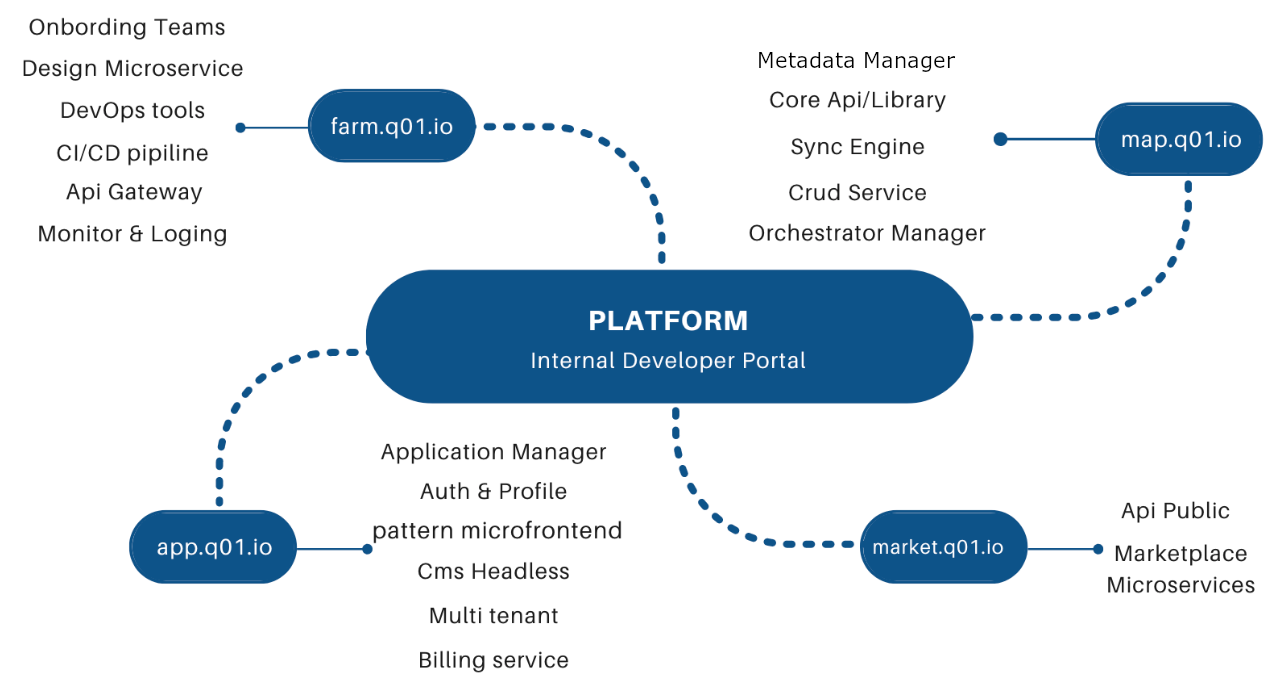Welcome to Q01 Platform, your Platform for the Future of Software Development!
Platform Engineering at Lanificio Digitale
The Lanificio Digitale Platform is set up as an Internal Developer Platform (IDP) for software release and lifecycle management for Lanificio's clients. It is designed to enhance the productivity of development teams and improve the Developer Experience and is developed across four distinct application domains, as shown in the figure.

The goal is to provide a set of tools and services that make teams self-sufficient in interacting with systems, allowing them to access or create tools to initiate, manage, and monitor development processes while integrating company policies into the application lifecycle.
The platform acts as an intermediary layer, reducing the necessary knowledge (cognitive load) to interact with the underlying infrastructure, which tends to become more complex with the widespread use of microservices, Kubernetes, and cloud-native technologies in general.
This significantly simplifies the work of development teams and facilitates a faster onboarding process for new team members with little experience or familiarity with the infrastructure. All of this contributes to releasing quality software faster while ensuring a frictionless Developer Experience.
Lanificio Digitale has its dedicated "platform team" responsible for maintenance, optimization, and expansion of its functionalities, technology selection, system configuration, security management, and scalability.
The Platform Team at Lanificio Digitale serves clients such as:
- Development teams of clients
- Development teams of partners utilizing the platform
The purpose is to ensure that each team experiences a comprehensive and straightforward usage of the platform. In this sense, the Platform Team must focus on all aspects of the software lifecycle, summarized below:
- Taking charge of managing cloud infrastructures, developing DevOps tools for cloud technology management, and developing core components to accelerate the development of application features.
- Facilitating the onboarding of new development resources into the team.
- Providing technological enablers to streamline every phase of the software development process.
- Ensuring an automated CD/CI process aligned with agile DevOps best practices.
- Simplifying the creation of applications as aggregates of microservices (Composable Enterprise).
- Streamlining the development of functional microservices on both the front-end and back-end, regardless of the chosen technological stack.
- Assisting in end-to-end application integration testing phases.
- Integrating development tools with agile methodologies for sprint management and task/user story tracking.
- Providing a canary deployment strategy allowing the deployment of new application versions alongside stable and production versions.
- Managing secure and personalized access for technical figures (internal or external) through development team and associated profiles management.
- Facilitating secure integration with third-party platforms.
- Transforming APIs into monetizable resources, turning them into real products (following the API as a Product - AaaP paradigm).
Here is a description of the target clientele and platform functions:
- Software-driven companies where software development is part of their business model.
- Digital startups with innovative business ideas that will use the platform to develop and launch their cloud-native applications quickly and efficiently, benefiting from the necessary technological infrastructure and team growth support.
- Traditional companies in the midst of digital transformation wanting to evolve and adapt to new digital challenges can leverage the platform for the digital transformation of their products and services with tools and services for integrating new technologies, developing microservices architectures, and adopting agile organizational models.
The q01.io platform at Lanificio positions itself for companies and partners as "Platform Engineering" in SAAS, enabling even small teams to facilitate the creation and distribution of cloud-native applications anchored to distributed and complex architectural patterns like microservices, fully leveraging cloud technologies and DevOps Agile best practices.